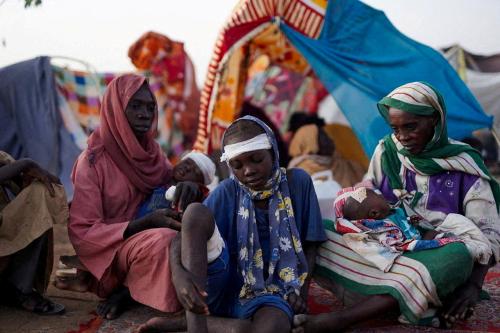On November 8, Ugandan President Yoweri Museveni and his wife publically tested themselves for HIV/AIDS to encourage all Ugandans to take steps to curb the spread of disease, which currently affects 7.3 percent of the population. Although Uganda has been successful in increasing HIV/AIDS education and also reducing the HIV/AIDS prevalence rate from an average of 18 percent during the early 1990s to approximately 6.4 percent by 2004/05, (UNAIDS 2011 figures), challenges remain. In fact, the HIV/AIDS prevalence rate stagnated at an average of 6.0 percent in 2004, but this trend reversed and the rate rose to close to 7.3 percent in 2011. With less than two and a half years left until the 2015 Millennium Development Goals (MDG) deadline, most countries—Uganda included—are still striving to meet this and other MDG goals and targets.
Approximately 130,000 new HIV infections are registered in Uganda annually according to estimations from the Ugandan Ministry of Health. Worse still, as noted above, the infection rate has been on the rise. This trend poses a challenge for Uganda in achieving MDG 6A on halting and reversing the spread of HIV/AIDS by 2015.
The increase in the HIV/AIDS prevalence has been blamed on the complacency of Ugandans—especially regarding sexual behavior—with the availability of anti-retroviral therapies (ARTs). Uganda has also experienced a slow uptake of proven prevention strategies like safe male circumcision (SMC). Despite the compelling evidence that SMC reduces the risk of heterosexually acquired HIV infection in men by approximately 60 percent, its uptake in Uganda has been slow, with only 26 percent of males aged 15-49 circumcised. Circumcision has largely been practiced on religious and cultural grounds and is not typically used as an HIV prevention strategy.
In addition, Uganda has not yet achieved its universal coverage of HIV/AIDS testing target by 2015. Knowledge of one’s status is an effective strategy for behavioral change and a critical link for obtaining care, treatment and other HIV/AIDS support services. Indeed, the recent move by Uganda’s president to publicly test for HIV underscores the importance of testing as a first step towards curbing the spread of the HIV virus.
Expanding coverage and uptake of HIV/AIDS testing and SMC could boost Uganda’s fight against HIV/AIDS according to recent research undertaken by the Economic and Policy Research Centre under the Global Development Network—Strengthening Institutions to Improve Public Expenditure Accountability Project.
In that report, my colleague, Ibrahim Kasirye and I find that scaling up safe male circumcision to 66 percent of uncircumcised adult males by 2020 would avert 121,278 adult HIV infections and would lead to total net cost savings of almost $790 million. Additionally, scaling up voluntary counseling and testing to reach 100 percent of “never tested” adults in Uganda by 2020 would avert 113,813 adult HIV infections and yield a total net cost savings of almost $734 million. The net cost savings are defined as the lifetime antiretroviral therapy costs multiplied by the annual number of infections averted, less the cumulative net costs of implementing the scaled-up programs. In less technical terms, cost savings are savings due to changes in policy strategy that reduce associated policy expenses, in this case provision of antiretroviral therapy and other therapies after infection.
For both polices, the cost savings are greater per infection averted than the values of the cost per HIV infection. This means that both policies can be feasibly scaled up. Thus to reverse the increasing prevalence and new infection trends, Uganda should expand coverage and uptake of a mix of different HIV/AIDS prevention methods and interventions as we move towards achieving the HIV/ AIDS related MDG.
Gemma Ahaibwe is a research analyst at the Economic and Policy Research Centre (EPRC) in Uganda. EPRC is one of the Brookings Africa Growth Initiative’s six local think tank partners based in Africa.
The Brookings Institution is committed to quality, independence, and impact.
We are supported by a diverse array of funders. In line with our values and policies, each Brookings publication represents the sole views of its author(s).




Commentary
Halting and Reversing the Spread of HIV/AIDS in Uganda: President Museveni Publically Tests for HIV
November 15, 2013